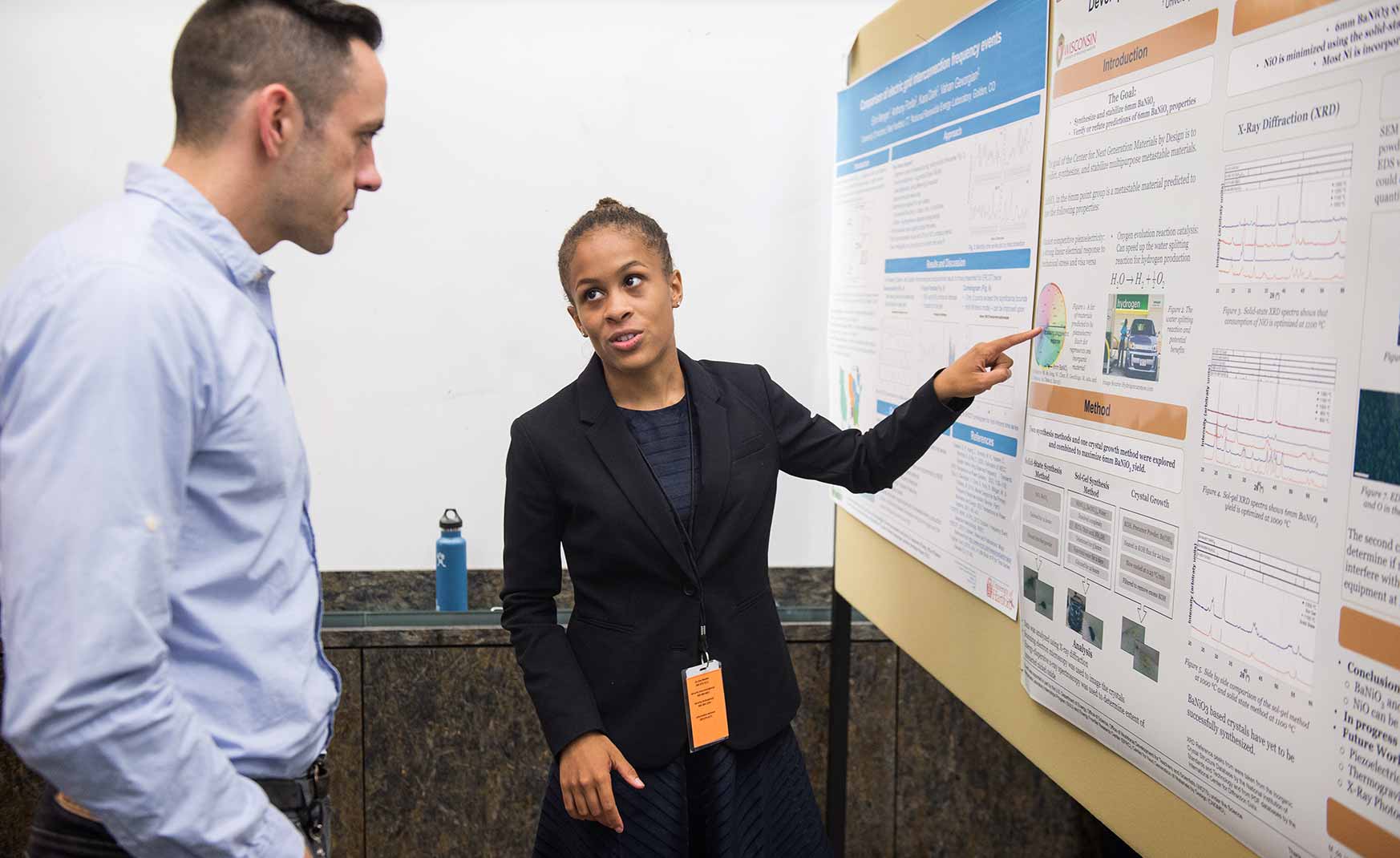The Community College Internship Program at NREL
The Community College Internship (CCI) program is a U.S. Department of Energy Office of Science undergraduate education and research program.

CCI Intern Riley Whitehead presents her research, Development of BaNiO3 for Piezoelectrics and Oxygen Evolution Reaction Applications, at the end of the term poster session.
Participation in the CCI program at NREL is designed to complement academic programs and provide students with valuable, hands-on technical and research experience. NREL provides the opportunity for interns to train as technicians or scientific researchers in world-class laboratory facilities under the direction of staff who serve as research advisors and mentors.
CCI Benefits
Pay: $18.25/hour
If your permanent address is more than 50 miles from NREL: Up to $500 for travel to and from NREL (airfare or personal car mileage)
Regional Transportation District (RTD) Eco Pass for bus and light rail
Watch this video for some housing tips from past interns.
What Interns Do at NREL
NREL conducts research in about 50 areas of scientific investigation, including photovoltaics, wind energy, biomass-derived fuels and chemicals, building efficiency, advanced vehicles, industrial processes, solar thermal systems, hydrogen, fuel cells, geothermal, distributed energy resources, energy integration, measurement and testing of renewable energy systems, hybrid systems, basic energy research, scientific computing, and energy analysis.
Interns spend their term engaged in a research project focused in these areas under the guidance of a laboratory scientist or engineer. Interns attend enriching professional development activities such as laboratory tours, speakers on scientific developments at NREL, and workshops that provide guidance and development of professional skills in writing technical research papers, oral presentations, and posters.
There are two types of CCI interns: CCI participants who are pursuing certification programs in specific technician areas such as HVAC, solar installer, etc., and CCI students who are getting an associate's degree with the intention of pursuing a four-year degree. Both work on technologies, instrumentation projects, or in major research facilities supporting the Department of Energy's mission, under the guidance of laboratory staff scientists or engineers.
Watch this video to learn what interns do at NREL.
Approximate Start Dates
Fall term (August–December): 3rd Monday in August for 10–16 weeks or 400 hours
Spring term (January–May): 3rd Monday in January, for 10–16 weeks or 400 hours
Summer term (June–August): 1st Monday in June, for 10 weeks
For the summer term, NREL has a "late start" date for participants who, for academic reasons, can't start on the first day. This later date is only for participants whose school term ends later than the beginning of the program. This date must be approved by NREL's Workforce Development and Education Coordinator.
In the Fall and Spring Terms, there is an option for a "flex schedule" where the equivalent of 400 hours spent onsite at NREL can be spread over a 16-week term. Under a flex schedule, weekly stipends are based on a 40-hours/week payment, prorated accordingly, with any housing allowance being based upon a 10-week duration appointment.
Visit the Office of Science CCI program website for information related to the application and selection process, eligibility, benefits, key dates, and more.
Tips for CCI Program Participants
In addition to the participant obligations listed through the Office of Science, all selected NREL CCI and SULI participants should consider the following before arriving at NREL.
Students will need to make your own arrangements as NREL does not have onsite housing.
Students will most likely conduct research at NREL's main campus in Golden, but you may be at the Flatirons Campus near Boulder.
By Air
All flight arrangements will be made for you. Selected students are provided one
round trip domestic travel to and from NREL, if permanent address is more than 50
miles from the laboratory.
By Car
Travel by a private automobile will be reimbursed at the current government rate
up to a maximum of $500 or the cost of the lowest commercial airfare, whichever is
lower.
Casual dress code is permitted at NREL; however, when working in any laboratories, interns must wear long pants, shirts that cover the shoulders, and closed-toed shoes. High heels cannot be worn in the labs.
Interns must wear business attire for the poster session. Please, no jeans or flip-flops.
Poster presentation, reports, and research papers– research interns only
Poster: Assessing the Short-Term Solar Forecasting Performance of Popular Machine Learning Algorithms
Report: Assessing the Short-Term Solar Forecasting Performance of Popular Machine Learning Algorithms
Poster: Using Iron Enriched Biomass for Fast Pyrolysis To Analyze the Possible Effects on Vapor Yield
Research papers: Optimizing Growth Conditions for 2D MoS2
Share
